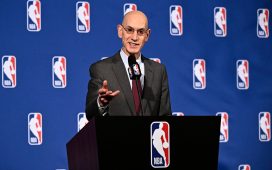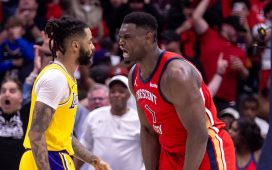CORAL GABLES, Fla. — The University of Miami has long been able to make a glossy pitch to the students it hopes will star on its sports teams: an exceptional athletic tradition, respected academics, South Florida’s sun-kissed glamour.
For months, though, coaches at Miami — and every other college in Florida — have had a new selling point: Play here and, thanks to a new state law, maybe make some money off your athletic fame.
Florida and four other states are poised to allow players to make endorsement deals starting this summer, and with universities in other states anxious about losing recruits, the N.C.A.A. is moving anew toward extending similar rights to college athletes across the country.
In an interview with The New York Times on Friday, the N.C.A.A.’s president, Mark Emmert, said he would recommend that college sports’ governing bodies approve new rules “before, or as close to, July 1,” when the new laws are scheduled to go into effect in Florida, Alabama, Georgia, Mississippi and New Mexico.
The changes together promise to reshape a multibillion-dollar industry and to test the N.C.A.A.’s generations-long assertions that student-athletes should be amateurs who play mainly for scholarships and that college sports appeal to fans partly because the players are not professionals.
“When I was playing college football, my priorities were girls, football and then school,” said Mark Richt, who led the football programs at Georgia and Miami before he retired from coaching in 2018. “Now it’s going to be money, girls, football, school.”
Under a proposal that has been before N.C.A.A. members for months, student-athletes could be paid in exchange for use of their names, images and likenesses by many private companies. The plan, which could take effect on Aug. 1, would also let players earn money through advertisements on their social media accounts.
“We need to get a vote on these rules that are in front of the members now,” Emmert said.
The current proposal would give colleges and universities the power to block some agreements if they conflict with “existing institutional sponsorship arrangements,” meaning that an athlete might not be able to strike an endorsement deal with Adidas if his or her college already has one with Nike. Other possible restrictions include bans on promoting sports betting and on hiring agents “to secure an opportunity as a professional athlete.”
Emmert and other college sports executives acknowledge, though, that the plans N.C.A.A. officials are contemplating will not fully resolve the sprawling debate. The proposed guidelines, which could still be modified, differ in some respects from the new state laws, which themselves are far from uniform.
“The inherent issue with the N.C.A.A. is its bylaw changes that were drafted don’t go as far as some of the state laws, so you’re still going to have tension around state laws and N.C.A.A. rules,” said Greg Sankey, the commissioner of the Southeastern Conference, where six of 14 colleges expect to operate under new statutes beginning in July.
Sankey is among the executives who have urged Congress to set a coast-to-coast standard to override a blur of state laws.
In Florida, for instance, colleges will be required to conduct financial literacy workshops for student-athletes. Colleges in Alabama may forbid their players to cut deals with alcohol companies. Georgia’s law allows for an arrangement in which players can sometimes be compelled to share portions of their income with other athletes.
Other states, including California, Michigan and New Jersey, have similar laws set to come into force in the months and years ahead.
The question of whether and how student-athletes should be able to make money has long simmered, particularly as many coaches drew seven-figure salaries,universities erected eye-popping athletic buildings and television rights deals brought in billions of dollars. The subject exploded in 2019, when California defied the N.C.A.A.’s warnings and passed its law, scheduled to take effect in 2023.
The N.C.A.A.’s deliberate pace toward change brewed more frustration among university administrators and lawmakers, leading to more proposals in more statehouses. In an interview last year, Donna E. Shalala, a former president of the University of Miami who became a Democratic member of Congress, lamented that the N.C.A.A. had “no strategy” and “no clear message” as it pleaded its case to lawmakers in the nation’s capital.
More than a year later, the swirl of statutes and potential rules still has the college sports industry looking to Washington for a fix. Although proposals are circulating on Capitol Hill, it is far from clear whether a federal bill will pass in 2021.
“We need a system that is fair to all of our student-athletes and protects the scholarships of student-athletes in both the revenue and Olympic sports and does not do anything to destroy the collegiate model that basically has provided life-changing educational opportunities to so many individuals, including my father, my brother, myself, my son,” said Kevin Warren, the commissioner of the Big Ten Conference, whose 14 universities are not in states with laws taking effect in July.
The N.C.A.A. had been planning a vote on its proposals in January, but postponed after the Trump administration raised antitrust concerns. Emmert said on Friday that N.C.A.A. officials had been in contact with the Justice Department to discuss the misgivings of regulators.
His conclusion that the association should now sign off on its long-planned rules will ease some nerves in college sports. Athletic officials have feared that the new state laws by themselves would abruptly create dramatic competitive gaps.
University and marketing executives across the country anticipate that some players will land extremely valuable agreements, but they expect most opportunities to involve local businesses offering thousands or tens of thousands of dollars — far from enough to, say, buy a glittering condominium overlooking South Beach.
“I don’t think everyone on the football team would get a shoe deal, let alone when you add in 300-plus other student-athletes,” said Blake James, the Miami athletic director who worked with state legislators to develop the Florida law.
Experts believe that new standards will be particularly important for women, who command large, loyal audiences as college athletes but have fewer lucrative opportunities in professional sports. But more broadly, the new rules could substantially benefit thousands of college sports participants who are largely barred under N.C.A.A. rules from earning money in ways that other students can. Those restrictions have increasingly angered Democratic and Republican officials.
“We don’t want to change the character of sports,” said Representative Chip LaMarca, the Republican architect of Florida’s law. “We’re just trying to add the same economic freedom and fairness that a typical student in college would have.”
Players are ready to embrace new opportunities. When Florida lawmakers mulled whether to delay the measure they approved last year, D’Eriq King, a Miami quarterback, wrote on Twitter: “Don’t back down now. Let us profit off OUR name image and likeness. We deserve it!”
Emmert would not discuss whether the association might challenge any of the state laws in court. He said, though, that he did not expect any decisions about new industry rules to hinge on the outcome of a case the association recently argued before the United States Supreme Court, which is considering the scope of the N.C.A.A.’s powers.
Complications loom amid widespread uncertainty about the rules, and there is a consensus that they will almost certainly change again, particularly if Congress steps in.
Consider Miami, one of three Atlantic Coast Conference schools to be covered by the new state laws.
Before and after Gov. Ron DeSantis signed Florida’s measure into law on Miami’s campus last June, university officials grappled with how to work under the new statute. In December, Miami announced that its football program had partnered with an Alabama firm, INFLCR, to help students navigate the thicket of rules and opportunities. Coach Manny Diaz promoted the agreement as the groundwork for players to “build your brand in the heart of one of the world’s most dynamic cities.”
But James, the athletic director, acknowledged that his staff’s preparations may have only so much of a shelf life.
“We’re planning under the set of rules that we know,” he said recently in his memorabilia-stuffed office. “The reality is that those rules are going to change at some point between now and I’ll say July 1, 2022.”
He conceded that he had probably not always been eager to see the types of changes coming. Then again, James said, he once voted on a proposal to limit text messages from coaches to recruits because, in the era before unlimited plans, students and their families found themselves facing exorbitant phone bills.
“Now, you fast forward, to think that we’re not going to text is crazy,” he said with a chuckle. The latest moves toward change have also come to seem inevitable.
“When you look at where social media is and the ability of an individual to really have a brand, yeah, we’ve definitely evolved to that spot,” James said.
Or as Richt, who is now a television analyst for the ACC Network, put it: “It’s here, so you better embrace it.”





